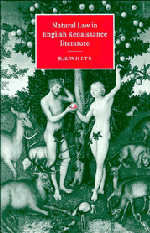Book contents
- Frontmatter
- Contents
- Preface
- Acknowledgments
- 1 Natural Law in history and Renaissance literature
- 2 The heritage of classical Natural Law
- 3 The reception of Natural Law in Renaissance England
- 4 Law and literature in sixteenth-century England
- 5 More's Utopia
- 6 ‘Love is the fulfilling of the law’: Arcadia and Love's Labour's Lost
- 7 ‘Hot temper leaps o'er a cold decree’: The Merchant of Venice and Measure for Measure
- 8 Shakespeare's The History of King Lear
- 9 Milton and Natural Law
- Epilogue: Hobbes and the Demise of classical Natural Law
- Appendix: Aquinas on the right to own private property
- Notes
- Select bibliography
- Index
Epilogue: Hobbes and the Demise of classical Natural Law
Published online by Cambridge University Press: 17 September 2009
- Frontmatter
- Contents
- Preface
- Acknowledgments
- 1 Natural Law in history and Renaissance literature
- 2 The heritage of classical Natural Law
- 3 The reception of Natural Law in Renaissance England
- 4 Law and literature in sixteenth-century England
- 5 More's Utopia
- 6 ‘Love is the fulfilling of the law’: Arcadia and Love's Labour's Lost
- 7 ‘Hot temper leaps o'er a cold decree’: The Merchant of Venice and Measure for Measure
- 8 Shakespeare's The History of King Lear
- 9 Milton and Natural Law
- Epilogue: Hobbes and the Demise of classical Natural Law
- Appendix: Aquinas on the right to own private property
- Notes
- Select bibliography
- Index
Summary
One small event in 1651 probably did more in the long run to eclipse Milton's reputation and the traditional notion of Natural Law upon which he relied than did any institution such as kingship. This was the publication of Thomas Hobbes’ Leviathan, a book which came to cast an enormous ideological shadow over post-Restoration thought right up to the present day. Indeed, Hobbes has been seen, rightly or wrongly, as the grandfather of the politics of political materialism and pragmatism, the economy of market forces, of possessive individualism, all of which dominated Britain and the USA in the 1980s, as well as of the totalitarianism of 1930s’ Germany, Italy, and Japan. Hobbes missed no opportunity to castigate those collectively instrumental in his own time in pursuing civil war, ‘thinking it a work of merit to kill, or depose, or to rebel against, the Sovereign Power’, but more than this it is his complete redefinition of Natural Law that served gradually to counter the ideas we have been examining. His influence was strengthened later by Bentham, whose corrosive attitude to legal fictions we have observed, and who dismissed Blackstone's version of Natural Law as a ‘formidable non-entity’ and its reasoning as a ‘labyrinth of confusion’.
It is tempting to say sweepingly, as many do, that Hobbes, with Bentham's collaboration, killed Natural Law, and there is some truth in saying he killed at least what it had been up to 1650.
- Type
- Chapter
- Information
- Natural Law in English Renaissance Literature , pp. 243 - 251Publisher: Cambridge University PressPrint publication year: 1996



